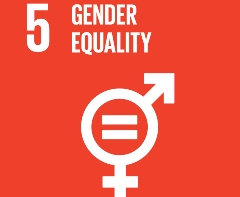.jpg)
Gender equality in global value chains
Across the world, the significance and contribution of women in global value chains is under-recognised. Research at The University of Manchester is helping companies realise and implement gender-equitable strategies to benefit their female workforce.
This work delivers on the UN Sustainable Development Goal 5: achieve gender equality and empower all women and girls.
Key facts
- More than 390,000 workers have benefited directly
- More than one million workers indirectly advantaged
- Major social compliance bodies adopt new gender strategy
The effect of the global value chain
Global value chains (GVCs) link firms of all sizes across production, distribution and retail across countries, cultures, political and trade boundaries. Sourcing is largely undertaken in low- or middle-income economies, using a low-wage female labour force to produce low-price quality goods. Gendered patterns of work in these GVCs provide incomes that can support women's economic empowerment, but can also relegate women workers to poorly paid and under-recognised labour.
Stephanie Barrientos, Emeritus Professor in Manchester’s Global Development Institute, has been researching the role of workers for more than a decade. Her particular focus is on gender in the production of consumer goods sourced by retailers and brands through GVCs.
Her work has changed the way a number of large companies deal with issues faced by women workers in the Global South, resulting in improved conditions and rights, enhancing prospects for millions of women worldwide.
Changing the gender conversation
Through the Capturing the Gains programme (funded by the UK Department for International Development), Professor Barrientos, and colleagues, advanced the concept of ‘gender-equitable’ social upgrading. Using extensive research across agriculture and apparel sectors in Africa, Asia and Latin America, Professor Barrientos has been able to demonstrate the benefits of gender equality on business performance and women workers' wellbeing in her book Gender and Work in Global Value Chains: Capturing the Gains? Cambridge University Press (2019).
Barrientos’s research helped validate that investing in women not only enhances their wellbeing, but also drives business outcomes.
Vice President for Responsible Manufacturing and Sourcing / Nike
Building on this research, Professor Barrientos undertook an in-depth gender analysis of selected GVCs under the UK government-funded Work and Opportunities for Women (WOW) programme. She collaborated with three large UK retailers to enhance the visibility of women and inform strategies to promote their leadership and economic empowerment in their global value chains.
Her research has directly influenced gender equality and advocacy strategies of corporations and civil society organisations, as well as government and international policy.
Working with companies such as Mondelez, Marks & Spencer, and the social compliance organisation Sedex, this research has resulted in:
- more than 390,000 workers in value chains in low- and middle-income countries directly benefitting from the implementation of gender-equitable strategies;
- more than one million workers being indirectly advantaged through opportunities for women to advance to leadership positions;
- partner companies adopting gender strategies that has potential to reach 33 million workers in 180 countries in the future.
Professor Barrientos has also advised the UK Ethical Trading Initiative, and Oxfam on its Behind the Barcode campaign, which has resulted in improvements on gender in the value chains of both Tesco and Wal-Mart.
Podcast: Gender equality in global value chains
-500x298-edited-160421.jpg)
In this podcast, The University of Manchester’s Dr Nic Gowland interviews some of our leading experts about how their research is helping to deliver the UN Sustainable Development Goals for global health, equality and sustainability.
Download the Gender equality in global value chains podcast transcript (PDF, 595KB).
Connected activity
- Other research by Professor Stephanie Barrientos (publications)
- Gender and work: capturing the gains in Global Value Chains with Stephanie Barrientos (lecture)
- Women workers briefing paper (PDF, 1.08MB)


